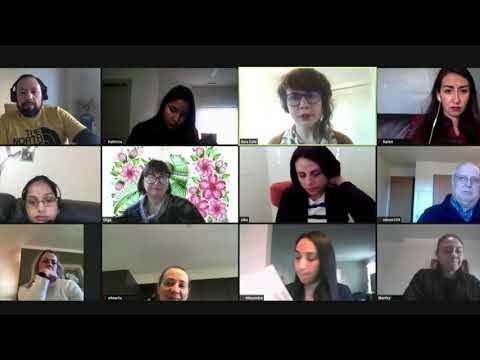English for Change: Unit 1 Digital Literacies and My Identities ~ Materi Bahasa Inggris kelas XI SMA
Summary
TLDRThis YouTube lesson focuses on English language skills, specifically for class 11, covering digital literacy and personal identity. The instructor introduces key terms like social interaction, discussion, and future identity. The session explores expressing opinions, agreeing, and disagreeing in English. It also delves into word stress importance, author's purposes in writing, and content creators' objectives in the digital age. The lesson aims to enhance students' communication skills and understanding of implicit information and subject questions.
Takeaways
- 😀 The session is a YouTube lesson focusing on English language material for class 11 students.
- 📚 The main topic is 'digital literacies and my identities', which is part of the English for change curriculum.
- 🔑 Key vocabulary includes social interaction, discussion, digital literacy, future identity, word stress, multimodal text, author, content creator, implicit information, inference, subject question, social media, and post.
- 🗣️ Expressions for stating opinions, agreeing, and disagreeing are taught to facilitate better communication in discussions.
- 📖 The importance of word stress is highlighted, including its impact on comprehension and meaning, and its role in effective communication.
- 📝 The purposes of an author are outlined, such as persuading, informing, entertaining, explaining, and describing.
- 🌐 In the digital age, content creators use social media for identity construction and various purposes like sharing thoughts, learning, and engaging in social storytelling.
- 🤔 Implicit information is explained as information that is implied rather than directly stated, requiring inference to understand.
- 🔍 Making inferences is described as drawing conclusions based on available evidence and prior knowledge.
- ❓ Subject questions are questions that seek information about the subject of a sentence, which is the person or thing performing the action.
- 🔗 Transition words and phrases are introduced as connectors that link ideas within sentences and paragraphs, such as 'first', 'second', 'initially', 'then', 'next', 'after', 'before', and 'in the end'.
Q & A
What is the main topic of the video script?
-The main topic of the video script is learning about digital literacies and identities, specifically focusing on English for change in a classroom setting.
What are some of the keywords introduced in the script?
-Some of the keywords introduced in the script include social interaction, discussion, digital literacy, future identity, word stress, multimodal text, author, content creator, purpose, implicit information, inference, subject question, social media, and transition words.
How does the script suggest using expressions for stating opinions?
-The script suggests using expressions such as 'I think', 'I don't think', 'I believe', 'In my opinion', 'To me', and 'Personally, I think' to state opinions.
What expressions are provided for agreeing in a discussion?
-To agree in a discussion, the script provides expressions like 'That's right', 'Absolutely', 'Exactly', 'I couldn't agree more', 'I understand what you mean', and 'A good point'.
How are disagreements expressed in the script?
-Disagreements can be expressed using expressions such as 'I don't agree', 'I totally disagree', 'I disagree', 'Not at all', 'That's not right', and 'I'm not sure about that'.
Why is word stress important according to the script?
-Word stress is important because it can affect the clarity and understanding of speech, change the meaning of words, and influence the listener's feelings, potentially hindering effective communication.
What are the purposes of an author according to the script?
-The purposes of an author include persuading, informing, enlightening, educating, entertaining, explaining, and describing.
How do content creators use social media according to the script?
-Content creators use social media for identity construction, sharing thoughts and images, enhancing connection with others, learning new things, sharing authentic stories, engaging in social storytelling, asserting agency, and building narratives.
What is implicit information and how is it comprehended?
-Implicit information is information that is implied or suggested but not directly communicated. It is comprehended by making inferences based on available evidence, previous knowledge, and experience.
What are subject questions and how are they used?
-Subject questions are questions asked to obtain information about the subject of something. They are used when seeking details about the person or thing performing the action in a sentence.
What are transition words and how do they function in speech or writing?
-Transition words are connectors that link and relate ideas within sentences and paragraphs. They help to create a flow in speech or writing by indicating sequence or relationships between ideas, such as 'first', 'second', 'initially', 'next', 'then', 'from here on', 'to begin with', 'last of all', 'after', 'before', 'as soon as', 'in the end', 'gradually'.
Outlines

هذا القسم متوفر فقط للمشتركين. يرجى الترقية للوصول إلى هذه الميزة.
قم بالترقية الآنMindmap

هذا القسم متوفر فقط للمشتركين. يرجى الترقية للوصول إلى هذه الميزة.
قم بالترقية الآنKeywords

هذا القسم متوفر فقط للمشتركين. يرجى الترقية للوصول إلى هذه الميزة.
قم بالترقية الآنHighlights

هذا القسم متوفر فقط للمشتركين. يرجى الترقية للوصول إلى هذه الميزة.
قم بالترقية الآنTranscripts

هذا القسم متوفر فقط للمشتركين. يرجى الترقية للوصول إلى هذه الميزة.
قم بالترقية الآنتصفح المزيد من مقاطع الفيديو ذات الصلة

Unit 5 Personal Money Management | Materi Bahasa Inggris kelas XI SMA Semester 2 English for Change

Adverbs - Final Demonstration Teaching - Grade 4 - Christine B. Garcia

Penerapan Pembelajaran Berdiferensiasi pada Mata Pelajaran Bahasa Inggris di kelas IX SMPN1 Sendana

21ST CENTURY SKILLS CATEGORIES

Teaching the Skills That Matter: Digital Literacy in Action

Last Material-Language and Identity
5.0 / 5 (0 votes)
